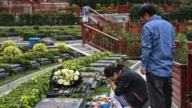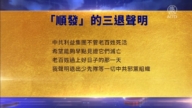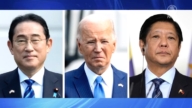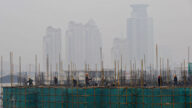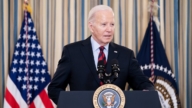【新唐人2011年5月30日讯】连日来,内蒙古牧民对当局抗议不断,当地局势持续紧张。为防止抗议浪潮进一步扩大,当局派出大批军警对部分地区实行军管戒严,并抓捕数十人。国际人权组织对此非常关注,呼吁中共当局尊重言论和集会自由,不要进行暴力镇压。
从5月22号开始,内蒙古连续几天出现抗议和示威活动,上千抗议民众一度与前来镇压的武警形成对峙。5月24号,锡林浩特市多所学校的2000多名学生,更是冲破校方封锁,走上街头,呼吁当局公正处理两起血案,“尊重牧民的利益和人权”。
5月26号,西乌旗、镶黄旗、东乌旗等地都出现民众游行抗议。在当局镇压中,一辆汽车故意冲向抗议人群,撞伤多名女学生,其中一人双腿被压成粉碎性骨折,另一女生脚部粉碎性骨折。
在持续的抗议活动中,一些示威民众被当局抓捕。5月27号,当局开始在西乌旗和正镶蓝旗等地实行军管戒严,并强制学生“周末不准回家,继续上课。”当局还关闭互联网聊天室。
但正镶蓝旗300多民众不顾禁令,依然走上街头,并冲过武警组成的盾牌墙,直冲政府大门,过程中有约40人被抓捕。
在内蒙古的紧张局势不断升级的情况下,国际人权组织“大赦国际”亚太事务负责人巴伯尔发表声明说:中共当局必须尊重抗议民众的言论和集会自由,不要暴力镇压。她强调,由于中共曾严厉镇压新疆和西藏等地区的抗议活动,所以外界很担心。
据了解,中国有600万蒙古族人口。长期以来,蒙古人在政治和文化上受到中共当局的压制。
公民力量执行主席、哈佛大学高级研究员杨建利博士认为,由于中共的民族政策,中国的民族问题非常严重,他说:中国没有一个少数民族地区实行了自治,而且还遭到了文化灭绝。
杨建利:“内蒙古现在的人口,汉人已经占了80%,它的语言现在也完全处于一种劣势。随着整个中华人民共和国境内的其他人权问题不断浮上台面,这个民族的压迫,还有文化的灭绝问题也会不断的暴露出来,今天我们只是看到其中一个事件而已。”
据传,当地民众计划在5月30号,于呼和浩特市进行大规模抗议。
杨建利:“未来的大规模抗议活动,应该不是有意的号召出来的,而是一种自发的。就是一些关键性的事件,这个事件一开始看起来非常小,但是最后它成为一个爆发点。”
《BBC》中文网报导,西藏和新疆的民族问题吸引了许多国际关注,但是内蒙古民众的困境却没有得到相应的国际关注。
杨建利则认为,中共觉得国际社会对它没有办法,所以对国际上的很多批评无动于衷。
杨建利:“我觉得国际社会不仅仅要呼吁,也应该寻找一些国际社会上的事——能够对中国(共)政府进行一些惩罚的,真正能让它感觉到有压力的一些方式。比如说,从联合国人权理事会里把它开除出去。”
杨建利表示,中共当局的维稳费用已经超过军费,中共已经把大部分的资源都压到了第一线。而《东方日报》也报导说,在当局严控之下,28号之后,内蒙暂时没有再传出民众聚集示威的消息。
新唐人记者常春、李谦、周天采访报导。
Inner Mongolia’ Protests Continue
In recent days, Inner Mongolian herders
continued protesting; authorities dispatched police
and a large army, declared martial law, and arrested
dozens to control the protests’ wave.
International human rights organizations are very concerned
and call on China to respect freedom of speech
and assembly, not to carry out a violent crackdown.
Since May 22, protests and demonstrations
have been erupting in Inner Mongolia, thousands
are squaring off with armed police.
On May 24, about 2000 students from the city
of Xilinhot disregarded the school’s attempts
to prevent them from leaving the school.
The students came out to demonstrate,
and called for resolving Mo Rigen’s murder case,
the violent “beating-to-death" incident by coal miners.
They demanded authorities
“respect the rights and interests of herders."
On May 26, people went on protests in Xiwuqi,
Xianghuangqi, Dongwuqi local areas.
During police crackdown, a car deliberately drove
toward protesters, injuring a few female students.
Two girls had fractured legs and feet.
Some demonstrators were arrested by authorities.
On May 27, authorities started military control in
Xiwuqi and Xianghuangqi areas, confining students
to “staying in school and continue classes
on weekends." Online forums are shut down.
More than 300 people in Zhengxianglanqi
crossed through the armed police shield wall,
straight into the gate of the government building.
Around 40 people were arrested.
Catherine Barber, Amnesty International’s
Asia Pacific deputy director said in a statement:
“Chinese authorities must respect freedom of speech
and assembly for protesters, not to carry out
a violent crackdown."
She stressed that, given the heavy repression
of similar protesters in Xinjiang and Tibet,
there are real grounds for concern about the situation
in Inner Mongolia.
here are 6 million ethnic Mongolian in China.
For a long time, the Mongols have been suppressed
in politics and cultural areas by Chinese authorities.
CEO of Citizen Power, a senior fellow at Harvard
University, Dr. Yang Jianli, said that China’s ethnic
problem is very serious and a result of the CCP’s
(Chinese Communist Party) ethnic policy.
CCP has never given autonomy to any minority
ethnic groups and their culture was destroyed.
Yang Jianli: “Han Chinese have accounted for 80%
of the Inner Mongolia population, which language
is completely in a disadvantageous situation.
With domestic and other human rights issues rising,
ethnic repression and issues of culture extinction
are also exposed. Today we see one such incident."
Bloggers are calling for a large-scale protest
in the capital city of Hohhot on May 30.
Yang Jianli: “Large-scale protests in the future
will be spontaneous rather than calling with intention.
These events at first appear very small,
but in the end become a flashpoint."
BBC Chinese network reported that ethnic problems
in Tibet and Xinjiang attract worldwide attention,
but the plight of the Inner Mongolia people
has not been given any international attention.
Dr. Yang Jianli believes that CCP didn’t respond
to criticism from the international Community (IC)
because it knew that the IC could not do anything.
Yang Jianli: “I think that the IC not only needs
to call out, but to also pressure CCP by inflicting
punishment, such as disqualifying it
from the United Nations Human Rights Council."
He also stressed that the CCP’s internal security
spending has surpassed its military spending.
CCP has moved most of the capital resources
to the front line. Oriental Daily also claimed
there were no reports on protests in Inner Mongolia
after May 28, due to the CCP’s tight security.
NTD reporters Chang Chun, Li Qian and Zhou Tian.



